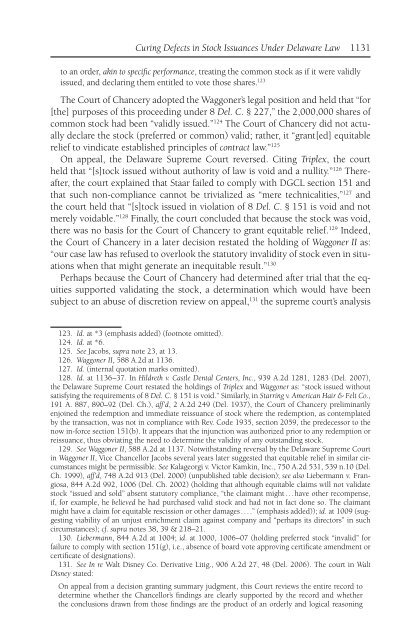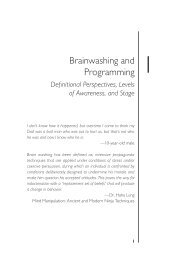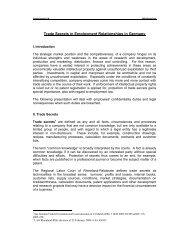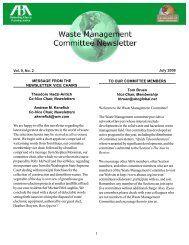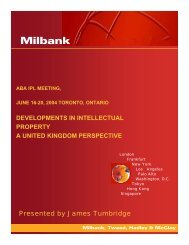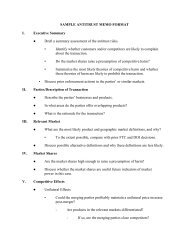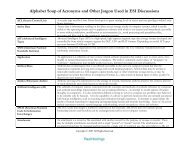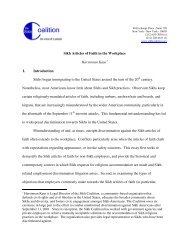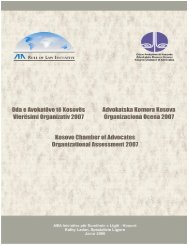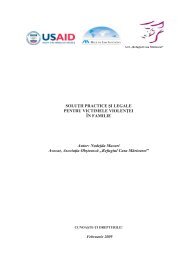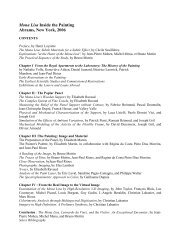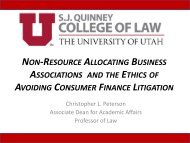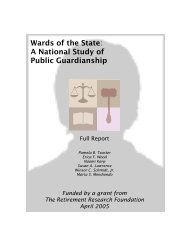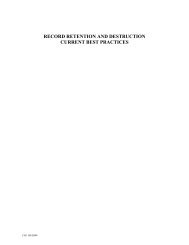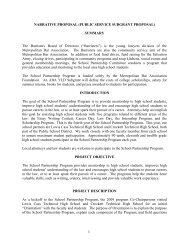Curing Defects in Stock Issuances - American Bar Association
Curing Defects in Stock Issuances - American Bar Association
Curing Defects in Stock Issuances - American Bar Association
Create successful ePaper yourself
Turn your PDF publications into a flip-book with our unique Google optimized e-Paper software.
<strong>Cur<strong>in</strong>g</strong> <strong>Defects</strong> <strong>in</strong> <strong>Stock</strong> <strong>Issuances</strong> Under Delaware Law 1131<br />
to an order, ak<strong>in</strong> to specifi c performance, treat<strong>in</strong>g the common stock as if it were validly<br />
issued, and declar<strong>in</strong>g them entitled to vote those shares. 123<br />
The Court of Chancery adopted the Waggoner’s legal position and held that “for<br />
[the] purposes of this proceed<strong>in</strong>g under 8 Del. C. § 227,” the 2,000,000 shares of<br />
common stock had been “validly issued.” 124 The Court of Chancery did not actually<br />
declare the stock (preferred or common) valid; rather, it “grant[ed] equitable<br />
relief to v<strong>in</strong>dicate established pr<strong>in</strong>ciples of contract law.” 125<br />
On appeal, the Delaware Supreme Court reversed. Cit<strong>in</strong>g Triplex, the court<br />
held that “[s]tock issued without authority of law is void and a nullity.” 126 Thereafter,<br />
the court expla<strong>in</strong>ed that Staar failed to comply with DGCL section 151 and<br />
that such non-compliance cannot be trivialized as “mere technicalities,” 127 and<br />
the court held that “[s]tock issued <strong>in</strong> violation of 8 Del. C. § 151 is void and not<br />
merely voidable.” 128 F<strong>in</strong>ally, the court concluded that because the stock was void,<br />
there was no basis for the Court of Chancery to grant equitable relief. 129 Indeed,<br />
the Court of Chancery <strong>in</strong> a later decision restated the hold<strong>in</strong>g of Waggoner II as:<br />
“our case law has refused to overlook the statutory <strong>in</strong>validity of stock even <strong>in</strong> situations<br />
when that might generate an <strong>in</strong>equitable result.” 130<br />
Perhaps because the Court of Chancery had determ<strong>in</strong>ed after trial that the equities<br />
supported validat<strong>in</strong>g the stock, a determ<strong>in</strong>ation which would have been<br />
subject to an abuse of discretion review on appeal, 131 the supreme court’s analysis<br />
123. Id. at *3 (emphasis added) (footnote omitted).<br />
124. Id. at *6.<br />
125. See Jacobs, supra note 23, at 13.<br />
126. Waggoner II, 588 A.2d at 1136.<br />
127. Id. (<strong>in</strong>ternal quotation marks omitted).<br />
128. Id. at 1136 –37. In Hildreth v. Castle Dental Centers, Inc., 939 A.2d 1281, 1283 (Del. 2007),<br />
the Delaware Supreme Court restated the hold<strong>in</strong>gs of Triplex and Waggoner as: “stock issued without<br />
satisfy<strong>in</strong>g the requirements of 8 Del. C. § 151 is void.” Similarly, <strong>in</strong> Starr<strong>in</strong>g v. <strong>American</strong> Hair & Felt Co.,<br />
191 A. 887, 890–92 (Del. Ch.), aff’d, 2 A.2d 249 (Del. 1937), the Court of Chancery prelim<strong>in</strong>arily<br />
enjo<strong>in</strong>ed the redemption and immediate reissuance of stock where the redemption, as contemplated<br />
by the transaction, was not <strong>in</strong> compliance with Rev. Code 1935, section 2059, the predecessor to the<br />
now <strong>in</strong>-force section 151(b). It appears that the <strong>in</strong>junction was authorized prior to any redemption or<br />
reissuance, thus obviat<strong>in</strong>g the need to determ<strong>in</strong>e the validity of any outstand<strong>in</strong>g stock.<br />
129. See Waggoner II, 588 A.2d at 1137. Notwithstand<strong>in</strong>g reversal by the Delaware Supreme Court<br />
<strong>in</strong> Waggoner II, Vice Chancellor Jacobs several years later suggested that equitable relief <strong>in</strong> similar circumstances<br />
might be permissible. See Kalageorgi v. Victor Kamk<strong>in</strong>, Inc., 750 A.2d 531, 539 n.10 (Del.<br />
Ch. 1999), aff’d, 748 A.2d 913 (Del. 2000) (unpublished table decision); see also Liebermann v. Frangiosa,<br />
844 A.2d 992, 1006 (Del. Ch. 2002) (hold<strong>in</strong>g that although equitable claims will not validate<br />
stock “issued and sold” absent statutory compliance, “the claimant might . . . have other recompense,<br />
if, for example, he believed he had purchased valid stock and had not <strong>in</strong> fact done so. The claimant<br />
might have a claim for equitable rescission or other damages . . . .” (emphasis added)); id. at 1009 (suggest<strong>in</strong>g<br />
viability of an unjust enrichment claim aga<strong>in</strong>st company and “perhaps its directors” <strong>in</strong> such<br />
circumstances); cf. supra notes 38, 39 & 218–21.<br />
130. Liebermann, 844 A.2d at 1004; id. at 1000, 1006 –07 (hold<strong>in</strong>g preferred stock “<strong>in</strong>valid” for<br />
failure to comply with section 151(g), i.e., absence of board vote approv<strong>in</strong>g certifi cate amendment or<br />
certifi cate of designations).<br />
131. See In re Walt Disney Co. Derivative Litig., 906 A.2d 27, 48 (Del. 2006). The court <strong>in</strong> Walt<br />
Disney stated:<br />
On appeal from a decision grant<strong>in</strong>g summary judgment, this Court reviews the entire record to<br />
determ<strong>in</strong>e whether the Chancellor’s fi nd<strong>in</strong>gs are clearly supported by the record and whether<br />
the conclusions drawn from those fi nd<strong>in</strong>gs are the product of an orderly and logical reason<strong>in</strong>g


